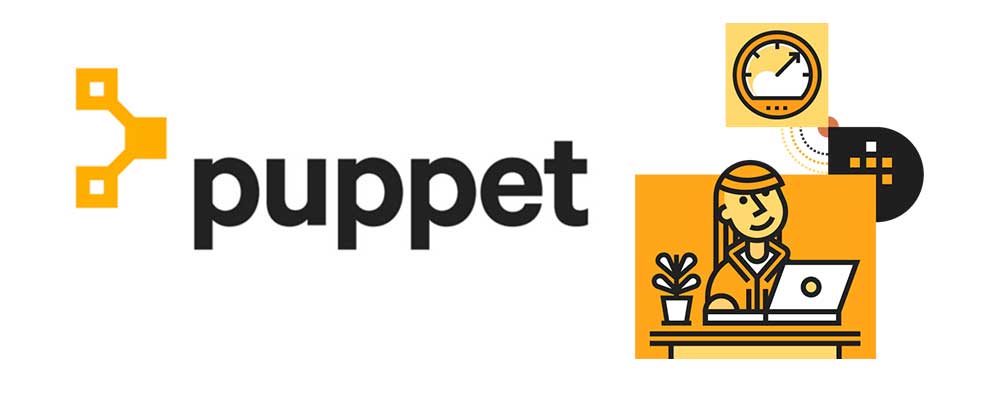Blog post
5 reasons why you should learn Puppet

By Samantha Allen 12 Sep 2019

Puppet is a DevOps tool that will save you time and boost your reliability. The DevOps way of doing things may be different from what you’re used to, but it’s proving to be groundbreaking for business. The time you invest in learning Puppet will be returned faster than you’d imagine. You don't even need to be an absolute expert to begin reaping huge benefits from using Puppet in your server room.
Once you understand how Puppet works, and how simple it is to implement into your environment, you’ll wonder why you haven't done it before. Read on to discover 5 reasons why you should learn Puppet as soon as possible.
What is Puppet?
Puppet is a DevOps tool for managing multiple servers. This software configuration management tool is most commonly used on Linux and Microsoft Windows, but you can use Puppet on other platforms too, including IBM mainframes, Cisco switches and Mac OS servers. Puppet is open-source, written in C++, Clojure and Ruby and includes its own declarative language to describe system configuration.
Whether enforcing the configuration of your infrastructure, hardening its security, or delivering it to hybrid and multi-cloud environments, Puppet’s platform lets you do it all at scale.
Reason 1 - Puppet will boost your productivity and profitability.
It’s no secret that IT performance has a clear impact on business performance. DevOps and Puppet will help your company to get more done in less time, boosting productivity as well as profits.
Puppet lets you automate the enforcement, security and delivery of infrastructure from one platform, at scale. Using Puppet will allow you to remove manual work and enforce consistency and changes across your data centre and cloud service providers. And you can start automating easily with even basic Puppet knowledge.
Read more about how Puppet boosts productivity HERE.
Reason 2 - Puppet is cross platform and easy to test.
Whether you’re using Microsoft Windows, Linux or Mac OS, Puppet can be tested and used on multiple systems. Puppet also allows resource abstraction so you won’t need to rewrite anything in order to test it in different environments.
Puppet allows you to automatically provision cloud infrastructure, microservices and containers. It gives you streamlined code delivery for hybrid and multi-cloud environments, so every scenario will be covered. Puppet also includes an intuitive dashboard so you will know how your infrastructure release will affect your environment and teammates in advance.
Reason 3 - Puppet is simple to learn and implement.
Puppet’s language is considered by many to be easy to learn when compared to Chef, which relies on existing Ruby knowledge.
With the right training, you can be implementing Puppet in a matter of days. The Puppet Essentials training course is a 3 day course which provides the necessary skills and techniques to install Puppet Master and Agent in order to carry out configuration management effectively. The course is presented as a mixture of lectures and hands-on exercises, which include both the Enterprise and Open Source versions of Puppet.
Book onto a Puppet training course HERE.
Reason 4 - Puppet is open source and customisable.
Puppet is available for free as an open source tool, but also has an Enterprise version. Because Puppet is open source it can be modified and customized, and you can tweak and improve it directly through modifying the source code.
You can find a vast amount of resources in the PuppetForge module repository and download whatever you need from the 3,500+ module library. This huge collection of modules can be used to extend Puppet across your infrastructure by automating tasks such as setting up a database, web server, or mail server, among others.
Puppet offers you a simplified and standard way to deliver infrastructure code with full control and visibility. Plus, it’s integrated with the most popular source control systems, cloud platforms and ChatOps tools so you don’t have to do custom integration work.
Find out more about Puppet Enterprise and Open Source HERE.
Reason 5 - Puppet makes security and compliance easy.
Puppet makes security and compliance inherent and automatic. With Puppet, you get the automation needed to continually enforce policies and the traceability required to prove compliance.
For the developer, Puppet enables hardware and software to be "scripted" so there's no need to learn the inner workings of an operating system.
How to get training for Puppet
Now you know these 5 benefits of using Puppet in your business, you may be wondering what to do next. A sensible first step is to invest in a training course to learn Puppet essentials. This 3 day course will teach you everything you need to get to grips with configuration management using Puppet Master and Agent.
For more advanced training, try the Configuration Management with Puppet course. This course can also be taken with the exam HERE. Each of these Puppet training options can be taken at a choice of dates or locations, or delivered in-house at your own office.
Have a question? Drop us a message to find out more about Puppet, DevOps and training course options to suit your business.

